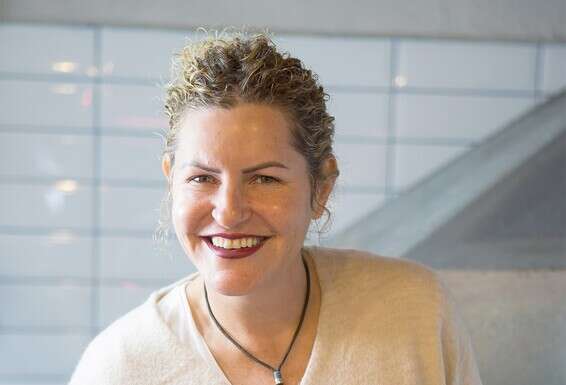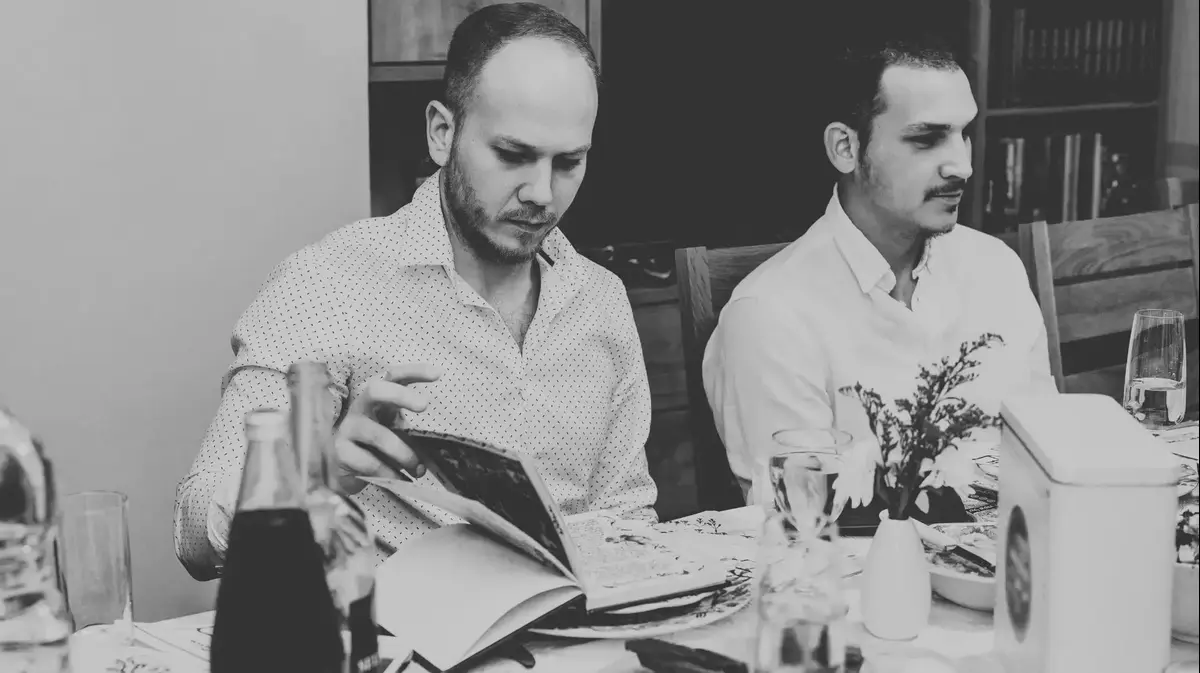From a fellow, kebab and papanash, lots of alcohol and a happy atmosphere: in her yard, Hani Heinik cooks food that preserves the sparkle of her parents' restaurant, the triumphal restaurant in Ashkelon
Meal in "Hanny's Victory". Restores the joy of memory of Romanian restaurants in southern Tel Aviv of the 1980s // Photo: Itiel Zion
Gabriella Maria was born in Transylvania, in a country from which snowy cliffs can be seen scratching the back of God, isolated herdsmen make mountains of Orda cheese to miss, yellow mustard fields are spread on a green floor, savonies are waiting for the next, the love of the wind, .
800 years since the Hungarians conquered Transylvania and to this day, she considers herself one of them. Woe to anyone who will call her Romanian. She is Hungarian, at most Transylvanian.
"They have their own mannerisms, for Transylvanians," laughs Henny Heinick, the youngest of Gabriella's three children, who once, at a hotel, saw how a lady covered a napkin after she finished eating. It was enough for her to recognize that it was a Transylvanian.
When we arrived at the courtyard in Ashkelon, where Hani holds Romanian cuisine, under the name "Hani's Victory," Gabriella was there. A meticulous lady with well-drawn eyebrows, and next to her is Yunnel. They both greeted us politely and disappeared, leaving their daughter to the media stage, which for many years covered their restaurant, "The Victory," in Ashkelon's city street.
"Mom always wore a tip top. Get up top in the morning, go to top tip. Wake up from surgery and put on ruby," says Hani, sipping giant tomato jars that will pinch the palate, preparing it for kebabs to get off the fire. Gabriella and Yonnel Heinik were in their late teens when they immigrated to Dimona. She came with her parents, he went up alone from Miyashi, in Moldova, the second largest city in Romania.
Cook Tip Tip
"At that time, Dimona had a jolly bunch of Romanians and Transylvanians," jokes Hani, urging his son who drank Spritz. "I've got the real thing," she waves a bottle of Carmel Hawk wine, that cheap, semi-dry white wine that went on the market in the 1930s and immediately boosts soda, and the two were "spritz," the bubbly drink, the best for happy throats when drinking The same distance from Romanian food.
Yunnel fell in love with the beautiful girl, her family, who knew the joy of food and drink as a way to quiet that scream of war.
In Dimona, Reuben, the eldest son, was born in Hani's eye, who today runs a cowshed with longing. The two girls, Michal and Chani, were already born in Ashkelon, from where Yunnel was traveling every morning to Tel Aviv, where he worked as a manager in the Tsibiak knitwear. Sometimes little Hani would travel with him to the big city, which she never asked herself: "I don't understand this stupidity, the thought of being the center of the world. We are on the same coastal strip, a few tens of miles away, but live at prices that allow you to breathe."
Hani Heinik. "I was a basic girl. Eating a white rib every day" // Photo: Itiel Zion
In Ashkelon, Hani's lover, Isaiah Livoshor offered her father a partnership at the Victory Restaurant. Livoshor, a butcher for a butcher family, was a soldier when he opened the restaurant in '49, on the ruined pharmacy ruins, which he renovated with a small loan from the Defense Ministry. He was at the front, singing his wife in the kitchen, and what started as a modest coffee, finding its way into austerity kitchens, became a Romanian restaurant that fed on peace and war, military, journalists, artists. Anyone on the way to Sinai.
In 1984, when Sarah became ill, he contacted Lionel to join him as a partner, details were verbally agreed and signed with a shake. "Nothing has ever been signed. This is another generation, a generation of word," says Hani. Gabriella, a tip-top cook, is what she cooked, bringing dishes like goulash soup and papanash, the Romanian donut on her head with sour cream and confit.
Gabriella kissed in Hungarian Romanian cuisine, influenced by Turkish cuisine and learned from it the power of roasting meat, as the Russians learned how to smoke it. A kitchen honoring corn porridge, which in the 17th century replaced Moldova with cereals.
The end of an institution
Hani (47), a tennis girl on a bicycle, a racquet under a house, would come every day to have lunch at a restaurant. "Basic girl. Every day eats a white rib." On holiday days, Livoshore, "whom we respected as grandfather," would give her a neck. She was 20 when she found out that the restaurant also serves beef cattle. But to this day her tongue prefers white.
At the age of 12, she began to be a waiter, especially on Saturdays. Like the adults, she was also paid plus tips, as she learned that orders were taken orally, without registering. "The majority were permanent. As they settled, we knew what to bring. The parents worked like crazy, Saturdays and holidays, the burden was on them. Livoshore, who is now in his 90s, was like a grandfather."
And as the days wore on, the south escaped from hiking, the municipality abandoned the pedestrian and parents grew weary. And my son, a flame girl, started brewing a desire to take the restaurant, march it on.
But Gabrielle and Yonnell, both in their 70s, who do not wish anyone the slavery life that a restaurant brings with them, probably their daughter, retired from her four years ago, taking only the same handshake they entered without paving the way for more. In May, last year, the Victory Restaurant closed permanently.
Gypsy love and violins
The parents' retirement from the restaurant and the realization that she was not going to enter made a huge change in Hani's life, which she then worked as a marketing manager at a plastic packaging company. Her marriage to Niv, the father of her two children, came to an end and she met Deppi, an Ashkelon her age, who over the years would see Hanni from afar and something unclear would stir in her stomach.
It was just Thursday evening, they were filming with other friends when Deppi told her she was in love with her. The next day, and without knowing each other, DeFee informed his man she was married and fell in love with the woman. That she wants to go to her. "It was perfectly clear to her, though nothing happened between us yet. Although she had not been with a woman before."
Hani, the life-riddled woman who knew the love of men and women in her day, was hard pressed by words and deed, but could not, for the stability they brought with them. Since then, they have shared a house with a yard.
Hani says it is this couple's support and support from their families that motivated her, and four months ago she began serving meals to the glory of Romanian cuisine in the courtyard. "When Deppi's dad, Tad Haddad, came and said 'Say what you need', then just stood and built a kitchen for me in the yard, it happened. That's support I haven't received from anyone in the world before."
I carry with me the joy of reminiscing Romanian restaurants in southern Tel Aviv in the late 1980s, early '90s, the exuberance of the voyage and vodka, the first white-necked bite in the pita, the rolling rosary of Marianna and Haim, Willie Vanello. With fried onions, fried with egg and cream, stuffed cabbage, grilled kidneys and butchers, which no one admits to being blasted with baking soda.
I remember the love stories that spanned the restaurants. The landlady who left her husband in favor of the grillman, who ran novels with waitresses in competing restaurants, women in over-makeup and gypsy violins coming close to the table, to accompany all of them with a sob.
Fellowship. Topped with bubbling butter, sour cream and egg egg // Photo: Itiel Zion
I knew something of that soul in Hanni's home yard, where the food exceeds that in my memory. A wonderful eggplant salad, scooping and topping with bubbling butter, cheese flakes, sour cream and an egg egg waiting for the fork injury, which is the egg yolk of it all. Beauty of pickles, hardened leg and chopped liver. A charcoal grill that sends kebab, which it serves alongside potatoes sprinkled in the oven, which you can't stop eating. A churba soup with meatballs, a wonderful papenash made on the spot and a bottle of quiche - a plump, plush distillate sent from there to fill cups, delight the eaters, and one brewer, a woman of lapidas.
Henny's Victory, at 17 Dovev St., Ashkelon, is open Wednesday, Friday and Saturday at noon. On Thursdays the place is also open in the evening, so there is great joy. On Wednesday Hani receives orders for home food for the weekend. Everything involves pre-order.
You can order on 050-2005810, email heinic40@gmail.com, or on Facebook under the name "Hani's Victory".
Choraba soup
I felt it was too early to ask for recipe lessons, so I bring you my choraba, which has a few teachers in it.
The name "churba", which means soup in Turkish, is owed to Romanians for the Ottoman Empire, which ruled the region for 500 years, and to this day is reflected in the Balkan pots.
The leaves of the Lauschtian plant are the soul of the soup. The other day I saw one of those in the Carmel market. Look for it in the big markets. If you haven't got it, go for celery leaves.
Choraba soup // Photo: Liron Almog
It's a simple recipe, but it takes time, so it's most convenient to divide it up into two days. Some add rice or pearl grits. At home, we gave up carbohydrates and added honey to the hinge.
On the first day, prepare the hinge. The next day add a dash of fat and add vegetables.
The first day ingredients:
• 1.8 kg of peanut, with corn bones, as the Argentinians call it
• 3 knee bones
• 1 tablespoon of honey
• 2 liters of water
• 1 tablespoon coarse salt
The ingredients for the second day:
• 2 peeled parsley roots and finely chopped or grated
• 2 finely chopped medium carrots or coarsely grated
• 1 coarse shredded celery root
• 2 tablespoons sauerkraut, filtered, finely chopped
• 1 tablespoon pickled red, filtered, finely chopped
• 1/2 lemon juice
• 1 bundle of leaves for a finely chopped oustian
Place the peanut, bones, honey, water and salt in a saucepan and bring to a boil. Reduce to a small heat and cook covered for about 3 hours. Drain carefully, from a low height. The knee bones are separate, and the trunk, even if broken apart, is kept in the fridge.
new day. Line the fat over the liquid that made overnight in the fridge. On medium heat bring the liquid to a boil. Add the root vegetables and bring to a boil. Lower the fire and let them cook for 8 hours. Add the cabbage and pepper, the lemon juice and the meat on the bones. Bring to another boil and turn off the fire. Add the Lauschtian leaves, wait about 7 minutes and serve. With or without any crushed.
hillaal1@gmail.com










/cloudfront-eu-central-1.images.arcpublishing.com/prisa/2C5HI6YHNFHDLJSBNWHOIAS2AE.jpeg)



